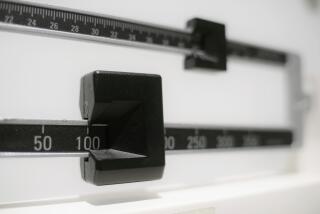Can smartphone apps really help you lose weight?
- Share via
When it comes to mealtime, I usually don’t pay much attention to calories. I eat until I’m full, and then I stop. Briefly. But I can report that a recent breakfast — a bowl of Honey Bunches of Oats, frozen blueberries and skim milk along with a few steak fries left over from the night before — added up to 343 calories, more or less.
I can also report that if I wanted to lose a pound in the coming week, I should try to limit myself to about 2,100 calories for the entire day. And if I managed to get away from the computer long enough to exercise, I’d have extra room for a cup-sized serving of Haagen-Dazs pistachio ice cream (580 calories) before bed.
I know all of this because I just got Lose It!, one of many smartphone apps that supposedly helps people manage their diets and, ultimately, lose weight. (My phone is actually embarrassingly dumb, so I signed up for the online version instead.)
The app, which is available free on iTunes and works on Apple products such as the iPhone and iPad, calculates a daily calorie budget based on your height, weight and weight-loss goals. You enter the foods that you eat and any exercise that you manage to get throughout the day, and it tells you how many calories you’ve consumed (or burned) and how close you are to your daily quota. You can update your weight to track your real-world results. As expected in this social media age, you can also automatically share your results with friends, assuming you have friends who are interested in pound-by-pound updates.
Both the Lose It! phone app and the online version are free. According to Charles Teague, chief executive of FitNow Inc., the company behind the app, about 7 million people have already downloaded Lose It!, although not all of them have stuck with it. About 25% of people who sign up use it regularly for at least a month, he says.
For another take on weight loss, you can buy the Thin-Cam app on iTunes for 99 cents. Like Lose It!, it works only on Apple products. You snap pictures of your meals and snacks, and the app keeps a record of your dietary exploits. You can also type notes to yourself in case you want to remember anything about a meal. The latest version lets you share these pictures with friends, again on the theory that your friends want to see your food.
The Thin-Cam doesn’t calculate calories or help you set a daily budget. But for $29.95, you can get connected with experts at the affiliated Thin-site who will assess your meal choices over a three-day period and email you personalized tips for slimming down.
The claims
The iTunes page for Lose It! says that the average active user has lost more than 12 pounds and that more than 85% of active users have lost weight. Teague says the app helps people think more carefully about their diet and exercise. “The upside is that it helps,” he says. “The downside is that [losing weight] is still hard work.”
Dr. David Edelson, the founder and president of Thin-site and an assistant clinical professor of medicine at Albert Einstein College of Medicine in New York City, says the Thin-Cam is a modern and more convenient incarnation of old-fashioned food diaries that have been proved to help people lose weight. “People don’t walk around with pens and paper anymore. But everyone has a smartphone.”
The iTunes page for the Thin-Cam says that it “torpedoes one of the biggest obstacles to healthy weight management — and that’s kidding ourselves about how much food we’re actually eating.”
The bottom line
No phone is smart enough to precisely track the calories in your lunch or the energy you spend walking your dog, but any app that makes you more conscious of your lifestyle can definitely make it easier to lose weight, says Dr. Kevin Patrick, a professor of family and preventive medicine at UC San Diego. Patrick co-founded Santech Inc., a company that uses text messages to reinforce healthy lifestyle choices.
Patrick says it’s “plausible” that Lose It!, Thin-Cam and similar apps really can help users achieve double-digit weight loss. And the potential to share progress with friends could be an important improvement over old-fashioned food diaries. “A lot of us are very excited about the social aspect,” he says.
But John Jakicic, director of the Physical Activity and Weight Management Research Center at the University of Pittsburgh, adds that sharing updates and photos with friends will only help if the people on the other end actively encourage your weight-loss efforts. (Otherwise, you’re just filling up their in-boxes.)
Jakicic says all of the “bells and whistles” on the smartphone apps might excite the techie crowd, but they won’t necessarily help people lose weight.
“The best indicator of how you’re doing is the number you get when you stand on the scale,” he says.
Curious about a consumer health product? Send an email to health@latimes.com.
Read more at latimes.com/skeptic.






